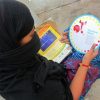Women and Girls with Disabilities: Planning for Periods During a Pandemic

DEHRADUN, India, Jul 10 (IPS) - The Coronavirus pandemic and the resulting lockdown has intensified most inequities in society- specifically those that affect vulnerable communities, including persons with disabilities, particularly young girls. As an aftermath of recent media attention, many government organizations, nonprofits and philanthropies have come together to ensure girls and women in remote communities have access to menstrual care products.
Despite these efforts, a large number of girls with disabilities who face the double burden of discrimination — stigma of disability and taboos associated with menstruation — have been left behind.
Girls and women comprise more than half of the total number of persons with disabilities. The majority of them live in low and middle income countries. A number of them are denied basic human rights because society is not set up to meet their unique needs. For instance, a large number do not attend schools, are not employed meaningfully, and are subject to neglect, abuse, violence, sexual harassment and much else.
Families and parents grapple with additional worries that include safety and hygiene around menarche (onset of periods) and menstruation. These concerns magnify for families whose daughters have cognitive and intellectual impairments and behavioural challenges as part of their disability. Knowledge and awareness around effective menstruation management becomes a challenge with heavy reliance on parents and or caregivers.
The pandemic has further worsened access and support due to restricted access, closure of establishments, traffic restrictions, and financial constraints. There are many families who are unable to afford disposable sanitary products for their daughters and rely on cloth which puts an additional burden of washing. These are re washed and reused- oftentimes, dried in closed spaces and corners that receive no sunlight, risking infection upon re use. Stigma continues around access, utilisation and safe disposal of menstrual products, particularly in urban poor and rural contexts.
Even outside pandemics and crises, the menstrual health needs of vulnerable populations need to be prioritized. Each girl deserves to have a safe and dignified menstrual experience irrespective of her disabilities. Policies and practices are best if inclusive and accommodate unique provisions and needs for girls and women with disabilities.
We propose the following four recommendations to ensure uninterrupted menstrual health services, particularly the supply of products during a pandemic or other emergency crisis situation.
First, it's important to have an inclusive crisis management policy, one that prioritises the sexual and reproductive health needs of the girls and women with disabilities with deliberation. Developing systems prior to pandemics so these services persist as essential and vital at all times, will support uninterrupted services.
Second, provision of supplies in adequate quantities is essential- on an average if a girl or woman uses 15-20 sanitary pads per month, providing at least three month supplies of 20 pads a month to each girl with a disability will be reasonable. Girls with intellectual impairment, more often than not, are unable to keep track of their menstrual dates or identify symptoms that develop prior to a menstrual period. Having an adequate stock of pads beforehand to safeguard against situations like this pandemic will prevent girls from resorting to unhygienic practices.
Third, having adequate training of community health workers to identify the number of girls with disabilities in the community and their future needs, well in advance, and communicate with the agencies monitoring supplies to ensure regular and ample supplies.
Fourth, agencies who link the disabled community to organisations and donors must have robust systems in place to match needs, when it is required and where it is required. The processes must be seamless with needs outlined in advance, donations matched well with needs, priority measures to determine disabled communities who need supplies the most and accountability in distribution.
If all donors and philanthropies could come together to enable creation of centralised nodal agencies to channelise procurement, distribution, monitoring and evaluation, the system becomes transparent, accountable and effective. Including disability organisations in the dialogue and the actual effort that follows will ensure establishment of supply chains that deliver on time to those that need it the most such as remote villages, urban poor settlements, migrant communities, hard to reach slums.
Some of the above are already in place in India and need integration and scale to reach vulnerable populations, like those with disabilities. UNICEF recommends through recent guidelines processes that could be implemented to ensure menstrual products reach girls during a pandemic; these could be adapted by including the voices of girls with disabilities in formulating strategies to meet their needs.
After all, periods don't pause for a pandemic and any other crisis and we need to ensure that the needs and challenges of the vulnerable population are adequately addressed.
Dr Shubha Nagesh is an Atlantic Fellow in Global Health Equity and works with the Latika Roy Foundation, Dehradun India
Monalisa Padhee, PhD, is the head of Women Wellness Initiative at the Barefoot College working with women and girls in rural India. She is a senior Aspen New Voices fellow and Atlantic Fellow for Global Health Equity.
© Inter Press Service (2020) — All Rights ReservedOriginal source: Inter Press Service
 Global Issues
Global Issues